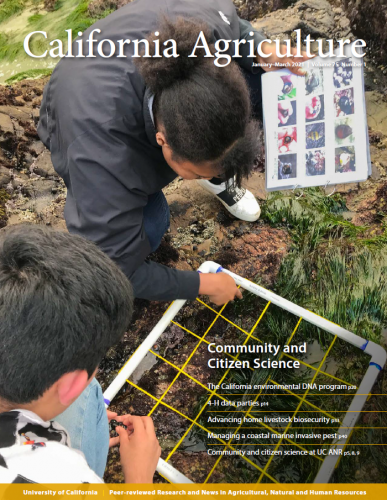Resources on CCS in Farms and Gardens
We’re proud to announce a new special issue of California Agriculture exploring the many ways that community and citizen science (CCS) are playing a role in cooperative extension. Ryan Meyer, Sabrina Drill, and Chris Jadallah served as guest editors of this collection, which spans a wide range of topics while illustrating the many different ways that CCS is used by extension professionals to advance their work. The articles complement the report we prepared for the UC Division of Agriculture and Natural Resources with forward recommendations for a CCS strategy. Read below for a list of articles and direct links.
Link to special issue webpage: http://calag.ucanr.edu/archive/?issue=75_1
PDF of Issue:
https://ucanr.edu/repository/fileAccessPublic.cfm?calag=fullissues/CAv075n01.pdf&url_attachment=N
Editorial
Community and citizen science: Inviting the public into UC ANR research
By Glenda Humiston
Community and citizen science fosters an appreciation for the scientific process, building scientific literacy and public support for research.
Introduction
Special issue: Community and citizen science
By Ryan Meyer, Sabrina Drill, Christopher Jadallah
In this special issue, California Agriculture presents research and news on community and citizen science projects across California
News
Report: Assessing community and citizen science at UC ANR
By Ryan Meyer, Sabrina Drill
The authors uncovered a rich diversity of projects that engage Californians in UC ANR research, and a variety of challenges and opportunities for expanding this work.
News
Community and citizen science projects around UC ANR
By Lucien Crowder
What do coyotes, eggs and leafy greens have in common? They’re all subjects of UC ANR research projects to which everyday Californians have contributed.
Peer-reviewed research and review articles
Data Parties engage 4-H volunteers in data interpretation, strengthening camp programs and evaluation process
By Marianne Bird, Kendra M. Lewis
A practice associated with citizen science allows 4-H stakeholders to better engage in program evaluation.
The CALeDNA program: Citizen scientists and researchers inventory California’s biodiversity
By Rachel S. Meyer, Miroslava Mungia Ramos, Meixi Lin, Teia M. Schweizer, Zachary Gold, Dannise Ruiz Ramos, Sabrina Shirazi, Gaurav Kandlikar, Wai-Yin Kwan, Emily E. Curd, Amanda Freise, Jordan Moberg Parker, Jason P. Sexton, Regina Wetzer, N. Dean Pentcheff, Adam R. Wall, Lenore Pipes, Ana Garcia-Vedrenne, Maura Palacios Mejia, Tiara Moore, Chloe Orland, Kimberly M. Ballare, Anna Worth, Eric Beraut, Emma L. Aronson, Rasmus Nielsen, Harris A. Lewin, Paul H. Barber, Jeff Wall, Nathan Kraft, Beth Shapiro, Robert K. Wayne.
By connecting different grassroots eDNA projects, and making data open to explore, we are finding patterns that may help guide eDNA-based biomonitoring.
4-H youth advance biosecurity at home and in their communities
By Martin H. Smith, Woutrina A. Smith, Cheryl L. Meehan
Yuba-Sutter youth successfully completed the 4-H Bio-Security Proficiencies Program and effected change as community science experts.
Engaging the importance of community scientists in the management of an invasive marine pest
By Edwin Grosholz, Sabrina Drill, Linda McCann, Kate Bimrose
Sustainable management of a nonnative predatory crab in a coastal lagoon in Northern California succeeded due to the involvement of community scientists.









